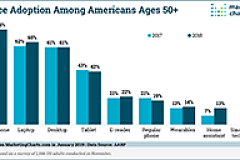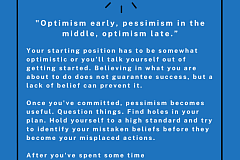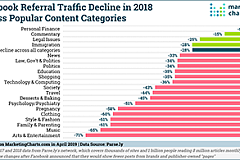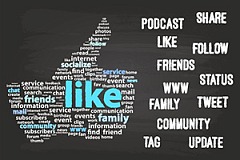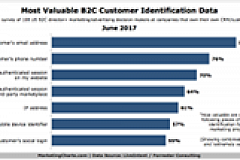 If you use Facebook in your marketing mix, there are new concerns about user engagement, suggesting you need to be more proactive than before about migrating your Facebook “followers” to your opt-in email list. During the past couple of years, my observation, now backed up with research, reveals that fewer people are posting updates about their lives and instead have moved on to sharing news (often “faux news” with spammy clickbait headlines), videos and stuff having little to do with themselves.
If you use Facebook in your marketing mix, there are new concerns about user engagement, suggesting you need to be more proactive than before about migrating your Facebook “followers” to your opt-in email list. During the past couple of years, my observation, now backed up with research, reveals that fewer people are posting updates about their lives and instead have moved on to sharing news (often “faux news” with spammy clickbait headlines), videos and stuff having little to do with themselves.
The drop is significant: 21 percent fewer posts with users’ own words and images from 2014 to 2015, and a 5.5 percent drop in sharing, according to a report in Inc. and The Information.
Why Facebook Followers Are Risky
Why is this bad news? Because sharing life events is the magnetic allure of Facebook that keeps users coming back. But if users aren’t sharing updates about themselves as much, and instead are posting faux news and cute animal videos, it stands to reason that Facebook users will engage less frequently or move on to other platforms where sharing is still predominant.
As to why people aren’t sharing as much, I posed that question on my own Facebook page, and a friend wrote this:
“I love connecting with friends and family who live far from me. But, as you have observed, fewer of these folks are posting personal photos/content. I have heard comments about:
- Fear of predators who see photos of children and then stalk them;
- Fear of current or future employers using your posts of party activities (toasting with an adult beverage) or concerts against you;
- General lack of privacy even when you think you’ve tightened your settings;
- Dislike for the targeted advertising — I post something about back pain and then I get ads and junk emails for related products;
- The systematic way Facebook decided what/who you prefer to see, even when you have marked the pages and people you want to follow first.”
5 Ways to Encourage Facebook-to-Email Opt-Ins
As a marketer, if you have followers on Facebook or any other social media, remember that you are merely “renting” the privilege of communicating with them. You don’t “own” the name as you would with your postal or email list. Here are some actions you can take to migrate Facebook followers to opt-in to email:
- Aggressively encourage your followers to opt-in to your email list. In the apps section on your Facebook business or organization page, you can embed a link within Facebook to opt-in to your email list, integrating with an email marketing system, such as MailChimp or others.
- Encourage followers to click on posts that lead to your website, and when they do, encourage them to opt-in to your email list. While most of us as consumers may not like pop-ups on websites, they work for building an opt-in list.
- You need strong headlines to earn clicks. With so many spammy clickbait headlines and faux news stories, be mindful about how you entice followers to click on your posts. Build trust with credible content.
- Your posts are going to sink down the news feed quickly. You have a couple of options: Post multiple times daily (some have found that four times per day is optimal, but change out the content each time), or pay to play with sponsored posts where you set the audience, amount you’ll spend and length of time the post will be boosted.
- Consider creating a custom audience using Facebook remarketing ads. After adding a pixel to your website, you can serve ads to people who visited within the past 180 days. This is one more tool to bring people back to your website to opt-in (or better, make a purchase).
The gold standard for generating conversions and higher ROI is email and postal mail. If you think you can completely replace these channels by posting to your followers on Facebook, your marketing performance will surely disappoint as Facebook risks becoming less about people sharing their lives.
My advice for a back-up plan: Don’t abandon Facebook. I’m certainly not jumping off the Facebook wagon for any of my clients, but work harder to grow your “earned” email list now, so you own the name.
- Reprinted with permission of Gary Hennerberg. Contact him at his consulting practice (http://hennerberg.com/) and have a look at his new book also: (http://www.customermindcode.com/).





